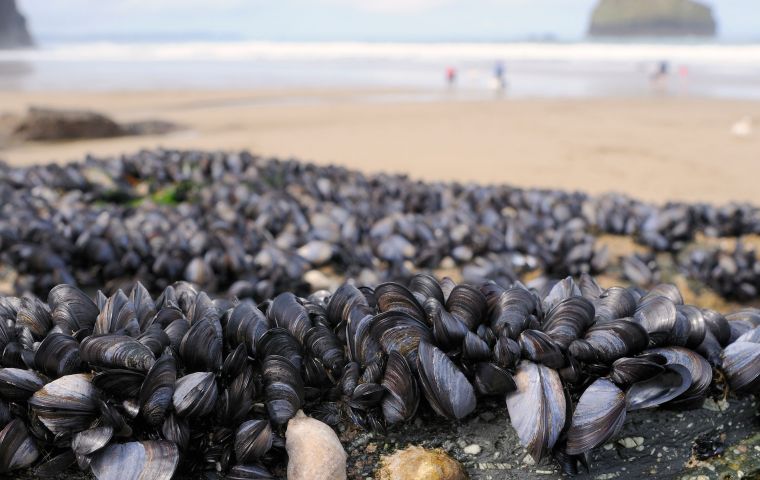MercoPress. South Atlantic News Agency
New Zealand die-off: half a million mussels “cooked” in the wild in unusually balmy waters
 Footage posted to social media shows rock pools choked almost knee-deep with mussel shells remarking “they're all dead ... there's nothing left”.
Footage posted to social media shows rock pools choked almost knee-deep with mussel shells remarking “they're all dead ... there's nothing left”. Up to half a million mussels were effectively cooked in the wild in unusually balmy waters on the New Zealand coast in a massive “die-off” that marine experts have linked to climate change.
The dead mollusks were found by Auckland man Brandon Ferguson earlier this month at Maunganui Bluff Beach, near the northern tip of the North Island. Footage posted to social media shows a stunned Ferguson wading through rock pools choked almost knee-deep with mussel shells remarking “they're all dead ... there's nothing left”.
Professor Chris Battershill, a marine ecologist at Waikato University, said there had been similar die-off in recent years involving tuatua cockles and clams.
“The common denominators seem to be really hot conditions with lots of sunlight and unusually calm waters for an extended period,” he said
“This leads to a combination of heat stress and the animals running out of oxygen because the water's so still. They eventually succumb... they're effectively cooked alive.”
“Is it related to climate change, I think it is,” Battershill said. “Mussels are hardy little animals - you think about when they're harvested they survive in the supermarket with just a little water on them.
”So it's taken extreme conditions to kill them. And when you have a number of die-offs in recent years involving a number of species then you really need to sit up and take notice.“
University of Auckland marine scientist Andrew Jeffs said more mass die-offs were likely to occur as a result of climate change. He said mussel populations would eventually move to cooler waters as temperatures rose.
”I am expecting that it is likely to ultimately result in the displacement of mussel beds from shores in northern parts of the country with them continuing to be found further south,” said scientist Jeffs.




Top Comments
Disclaimer & comment rulesCommenting for this story is now closed.
If you have a Facebook account, become a fan and comment on our Facebook Page!